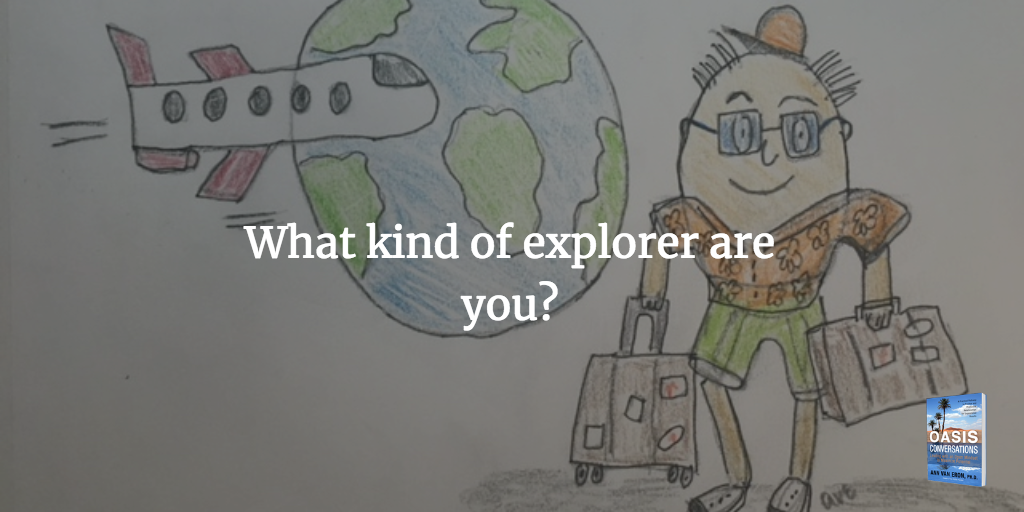
“The more that you learn, the more places you will go.”—Dr. Seuss
“I am still learning.”—Michelangelo at age 87
Many leaders and organizations are experiencing great uncertainty. The rules seem to be dramatically changing and people often report that it feels like the ground is shaking.
With the rapid introduction of technology, globalization and innovation, we each are called to be resilient and to continually reinvent ourselves. You are no doubt hearing reports that many jobs are changing with the emergence of artificial intelligence and other world changes. Futurists are predicting that we are approaching significantly more marked changes in the next decade. A colleague suggested the analogy of being on a plane to a dramatically different land. We need to ask if we are prepared for what we will experience after landing. Rather than being jolted and alarmed, we need to be open and curious like an avid explorer and learner.
I have traveled a lot and seen travelers who are alarmed when faced with different ways and keep wanting things to be “right” as they are back home. Others enjoy experimenting with new ways and work to understand different perspectives and grow from the experience.
We need to embrace the unknown and to commit to continuous learning and to be open to disruption. We also need to be kind to ourselves and to each other. Adapting is not a linear process and not easy either. Just like an avid traveler, we also need connection and support more than ever and at the same time we seem to be more isolated. In a more stable time the paradigm for change was to experience unfreezing and then refreezing and stability. Now, we need a different mindset. We need to be open for what we will find as we disembark from a plane ride to a distant land. We need to stay open, curious and embrace our love of learning without hoping for stability.
We also need to ensure that employees and students are continually learning. A report by the National Research Council suggests that a combination of cognitive, intrapersonal and interpersonal skills—flexibility, creativity, initiative, innovation, intellectual openness, collaboration, leadership, and conflict resolution—are essential for keeping up in the 21st century. More than preparing people for a specific role or career, people need to know how to learn, embrace change and be open-minded with strong conversational skills to work in complex global environments with diverse perspectives. We each need to be flexible to learn new skills and continually change roles.
Ed Gordon, author of Future Jobs and of the Gordon Report (www.Imperialcorp.com) posits that just as adjustments were required as we shifted from the Industrial Age to the Computer Age, we are experiencing a similar disruption as we enter the Cyber-Mental Age with a focus on innovation and intelligent machines. The U.S. labor market suffers from a lack of workers with the education and career skills needed in the tech-driven advanced economy. At the same time, workers are looking for jobs. Organizations are realizing the need to provide training and workers are recognizing the need to learn new skills. Some communities are bringing together various stakeholders including businesses, community members and schools to provide training and learning opportunities in Regional Talent Innovation Networks. Many organizations are feeling the pain of job vacancies and the lack of qualified workers and are expanding their training programs in order to have the talent they need. A challenge is that not all have mastered the critical skill of “learning to learn.” With this skill, people will have the confidence that they can explore and adapt to work in new and different ways. We each will be called to be flexible and resilient as marketplace conditions change. It will be easier with the confidence of being able to learn and with an explorer mindset. As leaders, we need to help others to embrace “learning to learn” and being an open and curious explorer in unknown lands.
As we shift in significant ways, we will benefit from working together rather than perpetuating polarization across differences. We need to learn with and from each other. I believe that adopting an open mindset and having the skills to effectively converse with people across disciplines, roles, locations and perspectives is one of the best ways to thrive in our current and evolving environment.
What are you doing as a leader to adapt an open-mindset embracing the uncertainty and continuous learning? What kind of connections and communities are supporting you as you explore new lands?
You are welcome to listen to an interview I had with Ed Gordon about the changing workforce conditions, the job-skills gap and the need to “learn to learn” at https://soundcloud.com/ann-van-eron/interview-with-ed-gordon
What kind of an explorer and learner are you?
